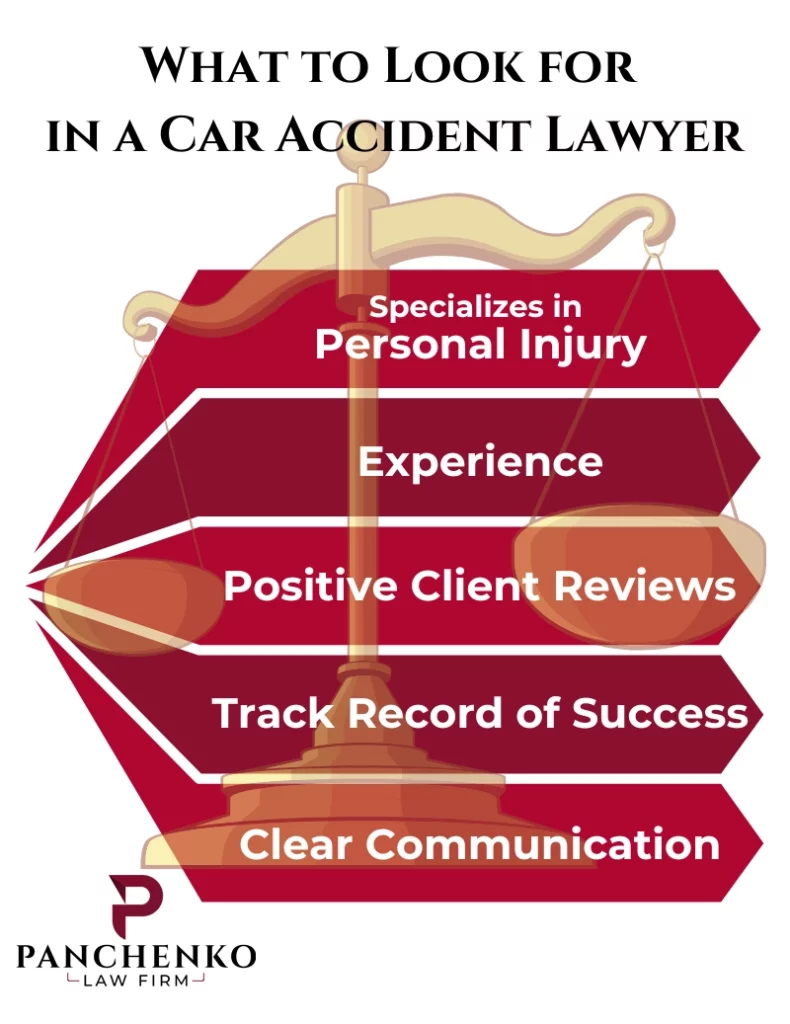Injured in a Car Accident? Trust a Proven Charlotte Car Accident Lawyer to Protect Your Rights
The moments after a serious car crash can be overwhelming — medical bills, lost wages, and constant calls from insurance companies can leave you unsure of what to do next. That’s where Panchenko Law Firm steps in. Our experienced Charlotte car accident lawyers provide the strong legal guidance and compassionate support you need during one of the most stressful times of your life.
At our firm, we understand that every collision is different. Whether your accident happened on I-77, Independence Boulevard, or anywhere across Charlotte, NC, our team will take the time to investigate your case thoroughly, explain your legal options, and fight for the full compensation you deserve.
We’re committed to helping you rebuild after an accident — not just financially, but personally. With Panchenko Law Firm, you get more than a Charlotte car accident lawyer; you get a dedicated advocate focused on protecting your future and ensuring justice is served.
With a proven record of success, Panchenko Law Firm has built a strong reputation across Charlotte, NC for delivering results that make a real difference in our clients’ lives. Our personal injury lawyers are known for clear communication, responsiveness, and a client-first approach — keeping you informed at every step of your case. We believe that trust is earned through transparency, consistent updates, and honest answers when you need them most.
Our deep understanding of North Carolina’s personal injury laws allows us to advocate powerfully on your behalf. We know how to stand up to insurance companies that try to undervalue your claim, and we fight to recover the full compensation you deserve — for your medical bills, lost income, vehicle damage, and the pain and suffering you’ve endured.
If you’ve been injured in a crash and are searching for a trusted Charlotte car accident lawyer, turn to Panchenko Law Firm. We’re here to help you move forward, rebuild your life, and obtain the justice you deserve after a serious accident.
Personal Injury Law Firm | Comprehensive Legal Support for Car Accident Victims
Panchenko Law Firm recognizes that car accidents can leave victims facing a multitude of challenges. From emotional distress and injuries to long-lasting effects like traumatic brain injuries and post-traumatic stress disorder, navigating the aftermath of a motor vehicle accident can be extremely tough.
Our dedicated team of Charlotte car accident lawyers offers comprehensive legal support tailored to meet your specific needs. From the moment you reach out to us, we prioritize your recovery and work diligently to secure the compensation you deserve.
When you choose our personal injury law firm, you can expect a thorough assessment of your situation. We will gather essential evidence, including police reports and witness statements, to build a strong case on your behalf. Our experienced Charlotte car accident lawyer are skilled in dealing with insurance companies, ensuring that your claim is handled effectively and efficiently.
We understand the emotional distress and financial toll that a car accident can cause. That’s why we focus on providing compassionate support while aggressively pursuing your rights. Whether you are dealing with medical bills, lost wages, or the pain of serious car accident injuries, our team is here to help you navigate these challenges.
Our legal support extends beyond just filing a claim. We will guide you through each step of the process, from initial consultations to negotiations with insurance adjusters. Our goal is to alleviate the stress associated with your case, allowing you to concentrate on recovery.
If you or a loved one has been involved in a car accident in Charlotte, don’t hesitate to reach out. Our team is ready to provide the legal assistance you need to move forward.
Our Approach to Securing Maximum Compensation for Your Car Accident Injury Case
We prioritize your recovery and work diligently to secure the maximum compensation you deserve after a car accident. Our experienced Charlotte car accident lawyers are committed to guiding you through every step of the legal process. We understand that each case is unique, and we tailor our approach to meet your specific needs.
From the moment you engage with us, we focus on gathering all relevant evidence. This includes police reports, medical records, and witness statements. Our legal team meticulously analyzes these details to build a strong case on your behalf. We know that thorough documentation is crucial for establishing liability and demonstrating the extent of your injuries.
Negotiation is a critical component of our strategy. We engage with the other driver’s insurance company to advocate for fair compensation. Our Charlotte car accident lawyers are skilled negotiators who understand the tactics used by insurance adjusters to minimize payouts. We will not settle for less than what you deserve. If necessary, we are prepared to take your case to court to fight for your rights.
Throughout this process, we maintain open communication with you. We believe that understanding your legal options and the status of your case is essential. Our commitment to transparency means you’ll always be informed and empowered to make decisions about your case.
Our approach to securing maximum compensation is built on thorough investigation, aggressive negotiation, and unwavering support. Trust Panchenko Law Firm to be your dedicated advocate in your car accident case.
The Cost of Hiring a Charlotte Car Accident Lawyer
When considering legal representation after a car accident, understanding how much a Charlotte car accident lawyer costs is crucial. Our car accident law firm operates on a contingency fee basis. This means you do not pay any upfront fees or hourly charges. Our payment is contingent upon winning your case. If we do not secure compensation for you, you owe us nothing.
This structure allows car accident victims to pursue justice without the burden of immediate financial strain. We believe that everyone deserves access to quality legal representation, regardless of their current financial situation.
Our contingency fee model covers various expenses related to your case. These can include costs for filing fees, medical record retrieval, and other necessary expenses. You will not be responsible for these costs unless we win your case.
Choosing a Charlotte auto accident lawyer should not add to your stress. With our personal injury law firm, you can focus on your recovery while we handle the complexities of your personal injury claim. We are committed to fighting for the maximum compensation possible while ensuring that you have no financial risk in the process.
Steps to Take After a Car Accident in Charlotte, North Carolina
A car accident can leave you shocked, injured, and unsure of what to do next. Whether the crash was caused by a speeding driver, distracted motorist, or someone driving under the influence, the moments after impact are often chaotic. However, the actions you take immediately after the collision can have a major impact on both your recovery and your ability to pursue compensation later.
By following the right steps — from getting medical care to documenting the scene — you can protect your health, preserve valuable evidence, and strengthen your potential personal injury claim. Here’s what every accident victim in Charlotte, North Carolina should do after a crash to safeguard their rights and prepare for a successful legal case.
Immediate Actions to Protect Your Rights as a Car Accident Victim
First and foremost, check for injuries. Ensure that you and others involved are safe. If anyone is injured, call 911 right away. It’s crucial to get medical assistance as soon as possible. Even if injuries seem minor, it’s wise to seek medical evaluation. Some injuries may not be immediately apparent but can have long-term effects.
Next, move to a safe location if possible. This helps prevent further accidents. Turn on your hazard lights and set up flares if you have them. If you can do so safely, exchange information with the other driver. Collect names, contact details, insurance information, and vehicle details.
Do not admit fault at the scene. Even if you believe you may have been partially responsible, it’s essential to avoid making statements that could be used against you later.
Documenting the Car Accident Scene and Gathering Evidence From Your Accident
After ensuring safety, document everything. Use your phone to take pictures of the accident scene, vehicle damage, and any visible injuries. Capture the road conditions, traffic signs, and any skid marks or debris. This evidence can be invaluable in supporting your claim.
If there are witnesses, ask for their contact information. Their accounts can provide additional perspectives on the accident. Additionally, file a police report if one is not already created. This report is often a critical piece of evidence in car accident cases.
Lastly, keep a record of all medical treatments and expenses. This includes doctor visits, medications, and any rehabilitation. These records will support your compensation claim.
Taking these steps right after a car accident can significantly influence the outcome of your case. If you have questions or need assistance, consider reaching out to a Charlotte car accident lawyer. They can guide you through the process and help protect your rights.
Charlotte Car Accident Lawyer Cases Frequently Asked Questions
When you find yourself in the aftermath of a car accident, it’s natural to have questions. Often, victims of someone else’s negligence are left angry and have severe injuries while facing the possibility of lost income. This is why Panchenko Law Firm emphasizes a compassionate approach and strives to offer prompt communication with our clients.
Understanding your rights and the legal process can make a significant difference in how you navigate the situation. Here are some frequently asked questions regarding car accident cases in Charlotte, North Carolina.
How Do I Choose the Right Charlotte Car Accident Lawyer?
Selecting a car accident lawyer in Charlotte, North Carolina can feel overwhelming. Look for a Charlotte car accident lawyer who specializes in personal injury law. Consider their experience, client reviews, and track record of winning cases. A good lawyer should communicate clearly and be dedicated to your best interests. Prompt communication and straightforward legal advice are paramount when it comes to picking a Charlotte car accident lawyer for your personal injury accident.
What Should I Do if I’m Injured in a Car Accident?
If you are injured, your immediate priority should be to seek medical attention. After ensuring your safety, document the accident scene. Take photos, gather witness contact information, and obtain a copy of the police report. This information will be crucial for your Charlotte personal injury claim. In most personal injury cases, the person with more supporting evidence is favored in court.
Will I Have to Go to Court for My Car Accident Case?
Not all car accident cases go to court. Many settle through negotiations with insurance companies. However, if a fair settlement cannot be reached, your Charlotte car accident lawyer may recommend pursuing legal action. They will guide you through the process and represent your interests in court if necessary.
How Long Do I Have to File a Car Accident Claim?
In North Carolina, you typically have three years from the date of the automobile accident to file a lawsuit in a personal injury case. However, it’s advisable to start the process as soon as possible. Delays can lead to complications and may jeopardize your chances of being able to recover compensation.
What Compensation Can I Expect from my Car Accident?
Compensation varies based on the specifics of your case. Common forms of compensation include medical bills, lost wages, pain and suffering, and property damage. Your Charlotte personal injury lawyer will help you assess your situation and pursue maximum compensation based on your losses.
What Happens If I’m Partially at Fault for a Car Accident?
North Carolina follows a contributory negligence rule. This means if you are found to be even 1% at fault for the accident, you may be barred from recovering any compensation. It’s crucial to have an experienced injury attorney who can argue your case effectively and protect your rights.
These answers should provide clarity as you navigate the aftermath of a car accident. If you have more questions or need legal assistance, reach out to Panchenko Law Firm for a free legal consultation. We are here to help you understand your options and advocate for your rights.
Why Choose Panchenko Law Firm for Your Car Accident Case?
If you’ve been involved in a car accident in Charlotte, North Carolina, reaching out to Panchenko Law Firm is a crucial step. Our team of dedicated Charlotte personal injury attorneys have a vast amount of combined legal experience in head-on car accidents, wrongful death claims, and personal injury cases.
We understand the challenges you face after an accident, and we are committed to helping you navigate the complexities of your case. Our lawyers are licensed to practice in North Carolina, South Carolina, and Florida, and we’re dedicated to providing experienced legal representation promptly and compassionately.
When you contact us, you can expect a free consultation with a Charlotte car accident lawyer to evaluate your situation. This no-obligation meeting allows you to discuss the details of your accident with a skilled lawyer and understand your legal options. Our experienced Charlotte car accident lawyers will listen to your concerns, answer your questions, and outline the steps we can take together to pursue fair compensation for any serious injuries and damages.
Our firm prides itself on a client-centered approach. We prioritize prompt communication, ensuring you receive updates on your case and answers to your inquiries as they arise. We believe that transparency is key to building trust with our clients.
Don’t hesitate to reach out to us. Schedule your free case evaluation today and take the first step toward securing the legal support you need. At Panchenko Law Firm, we are ready to advocate for your rights and help you recover the compensation you deserve (704) 900-7675






